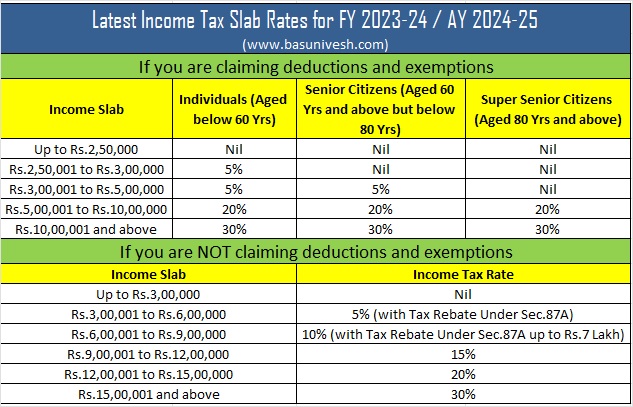What are the revised Latest Income Tax Slab Rates for FY 2023-24 after Budget 2023? During the Budget 2023, Finance Minster revised the income tax slab rates applicable for individuals. In this post, let us look into the revised rates.
The difference between Gross Income and Total Income or Taxable Income?
Before jumping into what are the Latest Income Tax Slab Rates for FY 2022-23 / AY 2023-24 after Budget 2022? Are there any changes to applicable tax rates for individuals? Let us see the details., first, understand the difference between Gross Income and Total Income.
Many of us have the confusion of understanding what is Gross Income and what is Total Income or Taxable Income. Also, we calculate the income tax on Gross Income. This is completely wrong. The income tax will be chargeable on Total Income. Hence, it is very much important to understand the difference.
Gross Total Income means total income under the heads of Salaries, Income from house property, Profits and gains of business or profession, Capital Gains or income from other sources before making any deductions under Sections.80C to 80U.
Total Income or Taxable Income means Gross Total Income reduced by the amount of permissible as deductions under Sec.80C to 80U.
Therefore your Total Income or Taxable Income will always be less than the Gross Total Income.
Revised Latest Income Tax Slab Rates FY 2023-24
There will be two types of tax slabs.
- For those who wish to claim IT Deductions and Exemptions.
- For those who DO NOT wish to claim IT Deductions and Exemptions.
Earlier, under the new tax regime, there were six income tax slab rates used to be there. This is now reduced to five income tax slab rates.
Do remember that the changes in income tax slab rates are applicable only to the new tax regimes. There is no change in old tax regime.
Also, earlier the standard deduction available for the salaried class and the pensioners including family pensioners is available only for the old tax regime. This is now available under the new tax regime also.
One more important announcement during the budget 2023 is that the new tax regime is a default tax regime. If you wish to adopt the old tax regime, then you have to select it.
Also, earlier, the rebate under Sec.87A was up to Rs.5 lakh. This is now enhanced to Rs.7 Lakh. Hence, if your income is below Rs.7 lakh and opting for a new tax regime, then you no need to pay the tax.
Let me now share with you the revised Latest Income Tax Slab Rates FY 2023-24.

I hope this information will be helpful to you. I have written the latest posts on Budget 2023 also. You can refer to the same at “Budget 2023 – 12 Key highlights impacting personal finance” and “Section 87A – How is income up to seven lakhs tax-free?“.



What is the new rule for PPF ?
Dear Ritu,
While investing, you will not get any tax benefits under new tax regime. However, yearly accrued interest and maturity is tax free in both old and new tax regime.
Pension =
Standard Deduction u/s 56
33-1/3rd or Rs 15,000
Dear Nresh,
Can you share the source of this information?
For Pensioner –
The deduction is available u/s 56 to the lower of 33-1/3rd of Pension Income or Rs 15,000…
Further the standard deduction for salaried earners more than Rs 15,50,000 is Rs 52,500 …
Kindly make the correction in your article…
CA NARESH DHARIA
Pl tell if I have taken House loan for 20 yrs, how much maximum interest amt can I claim under which section.
Dear Sanjiv,
Refer my earlier post on this “Capital Gain Tax on Sale Of Property in India“.
If my gross salary is Rs 27.5 L including all perks, how much tax i have to pay as per new Tax policy
Dear Varinder,
It is hard for me to tell any number without knowing your deductions and other financial decisions. Above that, this post is meant to just guide but not to calculate the taxation for each individual.
Please clarify if pensioners need to pay tax. Retired last year, government aided school teacher.
Dear Clara,
Pension is a taxable income. Hence, you have to pay the tax based on your income tax slab (explained above).
1.Standard deduction Rs.50000 also if basic salary Rs10Lacs
Employeer’s contributions U/s 80CCD(2) 10% on Basic plus DA, rebate available in New Tax Regime?
3.Is any amount limit for NPS contributions u/s 80CCD(2)? i.e. if my basic salary Rs.15 Lacs p.a. then employer’s contributions can be Rs.1.5 Lacs for NPS-80CCD(2)?
4.Any limit of both NPS U/s 80CCD(2) and 80CCD(1B)?
Dear Sharma,
1) Yes.
2) Yes.
3) Yes, there is a limit to it. Refer my post “NPS Tax Benefits“
Under new tax regime for FY 23-24 (AY 24-25), we have standard deduction of 50 k.
Is this only applicable if income > 15.5 lakhs , or by default . I heard only if it crosses 15.5 lakhs.
Is, 80CCD(1) or 80 CCD(2) available under new tax regime ??
Dear Mahesh,
There is no such limit of Rs.15.5 lakh and hence it is by default. Only 80 CCD(2) is part of new tax regime.
Pf and professional tax should be included or it will be included while calculating tax?
Dear Abhijit,
Please understand the difference of gross income to net income.
It is not clear from your table whether the Tax Rebate under Sec. 87A upto Rs. 5 lakhs is still available for the old tsx regime. Please clarify.
Dear Ragothaman,
It is available for old tax regime. No change in that.
How and Govt shout that Rs 7 lakhs total taxable Income is tax free, is it not jugglery? If I don’t clain sny deduction u/ss 80 C to 80 U and go for new tax regime only that may allow the exemption limit of Rs7 lakhs. So there is s precondition, that has to be manifest, proclaimed, but only shout for an enhancement of exemption of Rs 7 lakhs. This is totally wrong and misleading people. Should be stopped.
Dear Dilip,
If you are not comfortable with new tax regime, then you have an option to move to old one.
Basu
How govt giving 8% for SCSS and where they invest money to generate this return,
Dear Devan,
It is hard for Government to commit anything with GUARANTEE. That is the reason, rates are linked to the market. However, many things play here and hence, they not play with the emotions of people.